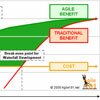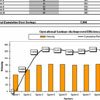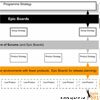Project Management

Self-Funding Projects – A Benefit of Agile Software Development
One of the many benefits of developing software in an iterative way is that you can start realising the benefit of your work before the project is officially ‘finished’.
22Jul2009 | taraleewhitaker | 3 comments | Continued
Value Points – Estimating the relative value of a User Story
Value Points can be used to measure the relative value of stories using a Fibonnaci Sequence. Although not appropriate or particularly necessary in all cases e.g. primarily when you have an omni-present Product Manager, these can be a useful way to prioritise and convey relative importance to a team. This approach becomes increasingly useful as teams scale to cover multiple projects combined with Business As Usual activities.
22Jul2009 | taraleewhitaker | 5 comments | Continued
The Agile Balanced Scorecard – Tracking the Reliability of an Agile Software Development Team
Reliability is one of the four performance measures that you should consider when building an Agile Balanced Scorecard. The other three are Value, Velocity and Quality.
19Jul2009 | taraleewhitaker | 0 comments | Continued
Using Velocity to measure the Productivity of an Agile Development Team
Although you can not use Velocity to measure the productivity of one team compared to another, you can use velocity to help track the relative productivity of the same team from one sprint to another assuming the value of a point stays the same over time.
18Jul2009 | taraleewhitaker | 0 comments | Continued
Software Estimation – the more precise you are, the less accurate you will be!
We often confuse ‘accurate’ (mean difference) with ‘precise (variance)’. It would be accurate to say that I was less than six foot tall, it would be precise to say that I was…
17Jul2009 | taraleewhitaker | 2 comments | Continued
Calculating the ROI of Implementing Agile Practices – Agile increases output and efficiency
So, it’s no secret that one of the big benefits of ‘going agile’ is the ability/opportunity to track and optimise team performance.
The big question from a programme management and business perspective is:
How do you measure the operational costs/savings associated with improved efficiency or increased disruption within an Agile Software Development team?
14Jul2009 | taraleewhitaker | 2 comments | Continued
Minimising the impact of Sprint disruptions
One of the biggest challenges we’ve faced is trying to balance project work or product development with business-as-usual (BAU) work that can’t necessarily be anticipated – how do you manage the risk of disruption?
10Jul2009 | taraleewhitaker | 3 comments | Continued
Velocity can be used to measure the output of any team…
var dzone_style=”2″;Velocity is a measure of how much work a team can complete in a set period of time. It is measured in Story Points and although it was originally created for use in Software Development scenarios, it can be used in just about every type of team scenario.
Velocity can be measured assuming you have… :
1 team (1 [...]
10Jul2009 | taraleewhitaker | 0 comments | Continued
What’s my team velocity?
I often get asked how an existing team would go about determining their Velocity (the average amount of work a team can complete in a set period of time), so I thought I’d write a post about how we’ve done it in the past…
10Jul2009 | taraleewhitaker | 0 comments | Continued
Lean, Scrum, Scrum of Scrums and Epic Boards!
So, when do you use Scrum practices, when should you consider Lean practices and when should you consider using Epic Boards?
8Jul2009 | taraleewhitaker | 0 comments | Continued



















